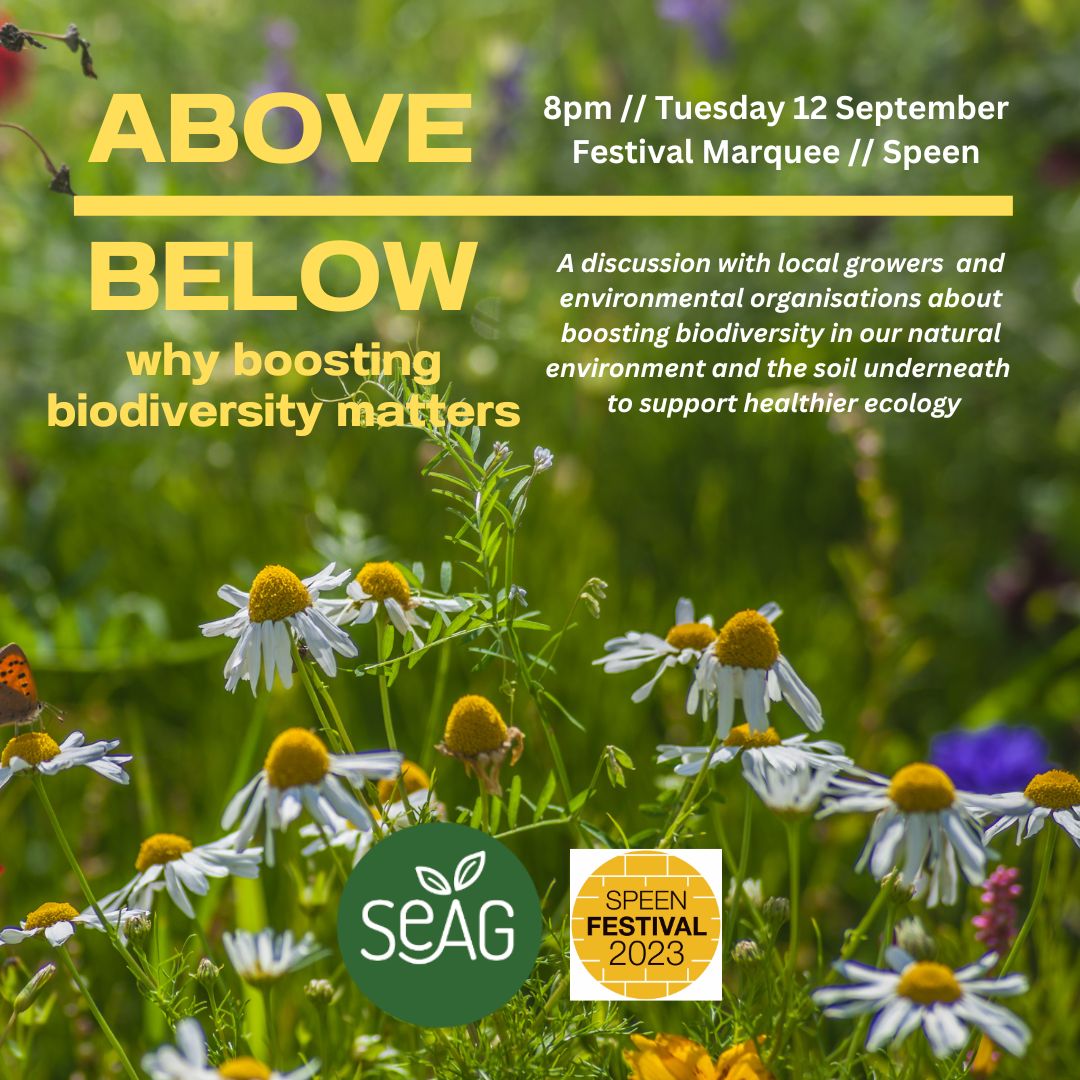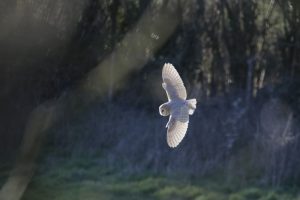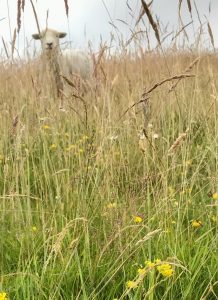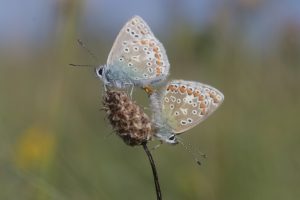Above / Below: Why boosting biodiversity matters
On 12 September at Speen Festival we hosted a talk about biodiversity and reconnecting with our local environment.

The air you breathe, the water you drink and the food you eat all ultimately rely on biodiversity. Some examples are obvious: without plants
there would be no oxygen and without bees to pollinate there would be no fruit or nuts; meanwhile trees and plants absorb carbon dioxide and other forms of pollution in the air; medicines are harvested from nature and plant systems give protection from the weather and erosion. But biodiversity – the complex ecology the supports our planet – is now in crisis.
The State of Nature report (back in 2013) was a remarkable, and remarkably troubling investigation into the health and prospects of UK mammal, insect and bird life in a way never before attempted, and its conclusions were that 60% of all UK species had declined in the last century, and 31 per cent had declined badly. More than 600 species are now considered to be threatened with extinction. Reports also suggest while the UK is clearly a nation on nature lovers, our country has experienced significantly greater long-term loss of nature than the global average. In fact, we are among the world’s most nature-depleted countries.
While there are many complex reasons for this biodiversity reduction – habitat loss, poaching and hunting, monoculture farming and heavy use of pesticides – reconnecting with our environment has to be key to nurturing and generating a healthy ecology and sustainable food chains. We are all part of the problem. But we can therefore all be part of the solution. In this discussion, we will hear from local farmers, landowners, growers and environmentalists about the importance of reconnecting with nature, boosting biodiversity both above and below the soil to support a healthier ecosystem. Speakers include Charlotte Downing (farmer/landowner) of Darvills Hill Farm, Emma Plunket (landscape designer, horticulture and RHS committee/lecturer) of Chiltern Forage Farm, Nick Marriner (Landowner engagement officer) Chilterns AONB and Eloise Lloyd (landowner) of Upper Warren Farm. We will also be joined by Wycombe-based ethical gardener, Toby Brown, to broaden the discussion beyond larger scale land ownership to practical ideas and examples of what we can all be doing in our gardens to boost biodiversity.

images courtesy of Jamie Harland
Conservation organisations report that the loss of nature is outpacing efforts to tackle it, and call for a shift to much more wildlife-friendly farming – modern agricultural practices (including intensive farming and use of inorganic chemical pesticides and fertilisers) are often cited as key reasons for species decline, so SEAG invited a number of local farmers, growers and gardeners to an open discussion about their own experiences and thoughts on land use and supporting natural ecology in our area.

Charlotte Downing, from Darvill’s Hill Farm, took us through her family’s journey reinvigorating a relatively unloved piece of land through restoration of hedges, extensive tree planting (sometimes supported by local community planting initiatives), introducing small numbers of rare breeds and hosting the establishment of hives and small scale specialist commercial growing (see below). For Charlotte, actively regenerating the land through a number of different people-led initiatives has led to a much richer ecology, with burgeoning wildlife thriving alongside/as part of the environment rather than pushed to the fringes.
Image left: Darvill’s Hill Farm wildflower meadow
Taking on another regeneration project is Eloise Lloyd, who’s family own Upper Warren Farm. The land has largely been rented to other farmers, or used simply for paddock grazing, but Eloise shared plans to rewild large areas of the farm, creating wildflower meadows and establishing fruit trees using old plans of a former orchard on the site along with identification of some old hardy specimens to select varietals including apple, greengage, damson and cherry. Even in the short time since they have started to leave areas grow wildly, Eloise has been thrilled to see large numbers of wild grasses and flowers popping up, which have then attracted greatly increased butterflies numbers.
Next up Nick Marriner, landowner engagement manager from Chilterns AONB talked about the local farm cluster of 14 landowners, actively supported by Chilterns AONB to support and encourage biodiversity and conservation in our special chalk grassland habitat. This cross-farm strategy includes species surveys, installation of bird boxes for key species, supplementary feed for wild birds during winter months, dedicated field margins and hedgerow planting, and working parties in association with Chiltern Rangers to share skills and knowledge. Meanwhile Chalk, Cherries & Chairs is an ongoing initiative to connect to the wildlife and cultural heritage of the Chilterns, and hosts educational walks and talks, and citizen surveys for wildlife identification.
Next we welcomed Emma Plunket, horticulturalist, RHS Lecturer and landscape designer who has established Chiltern Forage Farm on the slopes below Speen. Just before lockdown Emma took over an unloved, overgrazed pasture and has largely left the land untouched in order to see what grows now the sheep have gone. Emma’s philosophy is in learning through observation, and she encouraged us all to look again at whatever areas of land we have to allow nature to show us the way. New discoveries are emerging all the time, both flora and fauna, and the once overgrazed land is now a rich, biodiverse wildlife habitat hosting clouds of butterflies during the summer months.
Simon Bolton joined us from Badgers Garden, a successful seasonal salad and cut flower grower based in Lacey Green (and also cultivating a plot at Darvill’s Hill Farm). Simon is an ardent proponent of Charles Dowding’s No Dig approach to horticulture, allowing the soil to establish a natural health ecology by leaving organic matter on the soil surface, rather than working it into the soil. Dowding proposes that if the soil is left unmolested, the community of biodiverse microbes, insects, invertebrates and important fine fungi can thrive leading to healthier soil and as a result bigger, better harvests. The proof is in the eating, and Simon now sells his produce at top London restaurants and fine dining establishments.
 Finally, ethical garden Toby Brown shared thoughts and advice encouraging us all to think about sharing our gardens with wildlife. Residential gardens make up the third largest land use group in England (4.9%) and so even the smallest patch left to grow wild can make a big difference for nature and biodiversity. Toby encouraged us to consider No Mow May (June, July….) introduce pollinator-friendly plants, log pile habitats and leave areas wild, and consider permaculture practices: people care, earth care, fair share. Toby is also an advocate for rewilding on a much larger scale, and provided plenty of food for thought by proposing a different way for using our environment which might involve the reintroduction of apex predators and moving to a plant-based agricultural system.
Finally, ethical garden Toby Brown shared thoughts and advice encouraging us all to think about sharing our gardens with wildlife. Residential gardens make up the third largest land use group in England (4.9%) and so even the smallest patch left to grow wild can make a big difference for nature and biodiversity. Toby encouraged us to consider No Mow May (June, July….) introduce pollinator-friendly plants, log pile habitats and leave areas wild, and consider permaculture practices: people care, earth care, fair share. Toby is also an advocate for rewilding on a much larger scale, and provided plenty of food for thought by proposing a different way for using our environment which might involve the reintroduction of apex predators and moving to a plant-based agricultural system.
SEAG is very grateful to all our speakers for giving up their time to share their experiences and insight. It was a wonderful opportunity to hear about successful initiatives being practiced locally to boost a health ecology and gave plenty of inspiration about how we can all make a positive difference by making space for nature.